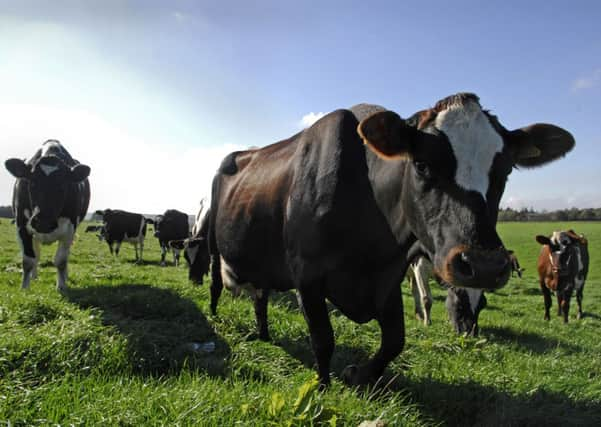Politicians want direct action to ease dairy crisis


The sustainability of milk production is under political scrutiny because of major falls in the prices paid to farmers for the milk they produce.
Since a short-lived high in February last year, when average farm gate milk prices reached almost 34 pence per litre (ppl), prices have tumbled. The National Farmers’ Union said some farmers are now getting as little as 19ppl. The current average is thought to be around 24ppl.
Advertisement
Hide AdAdvertisement
Hide AdThe price squeeze is seeing many farmers quit dairy, a trend which is now ingrained historically, with just 685 of the 1,999 dairy farmers who operated in Yorkshire at the turn of the century still in business today.
To help arrest the decline, the Dairy All-Party Parliamentary Group (APPG), a group of MPs which reformed last year to guide the Government on supporting the dairy industry, has published a new report, entitled ‘The Sustainable Competitiveness of the British Dairy Industry’.
A key recommendation is for the EU to raise its ‘intervention price’. Intervention involves the EU buying bulk butter and skimmed milk powder at a fixed price to provide stability to the market. The intervention price is currently around 17ppl and has not been reviewed since 2007.
The report calls for support to explore new ways to mitigate the impact of volatility - Russia’s trade embargo and lower demand for dairy products from China are blamed for low world milk prices. The report specifically backs the development of ‘futures markets’ which would enable both buyers and sellers of dairy products to fix their prices in advance - a scheme used in North America.
Advertisement
Hide AdAdvertisement
Hide AdNeil Parish MP, chairman of the Dairy APPG, said: “We must not forget that the long-term prospects for the British dairy industry are positive. The global demand for dairy is on the rise and the UK has an important role to play when it comes to meeting this demand. In the meantime, we must not be complacent and we must consider every tool in the box to alleviate the current pressure on the industry and foster profitability and growth in a sustainable way.”
Other recommendations to the Government include: extending the powers of the Grocery Code Adjudicator; explore more new markets for British dairy products; promote the nutritional qualities of dairy products; encourage dairy consumption from a young age; mandatory Country of Origin labelling for all dairy products; more procurement of British dairy products across public bodies, and work with Brussels to develop current free-trade agreements.
Billy Keane, chairman of Dairy UK, said the report recognises “crucial steps” that the Government needs to take to support the dairy industry, who added it was also crucial to address “misconceptions about dairy, especially from a nutritional point of view”.
Ian Macalpine, chairman of the Royal Association of British Dairy Farmers, also backed the report, adding: “We need the whole dairy supply chain to work together, from Government giving its support and accepting its responsibilities, to retailers offering a realistic price for milk because all evidence shows that consumers value milk and dairy produce and are subsequently prepared to pay more.”